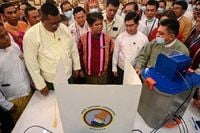Myanmar’s military-appointed government has set December 28, 2025, as the starting date for long-promised national elections, a move that has drawn sharp criticism from international observers, pro-democracy activists, and ethnic minority groups. The announcement, made on August 19 by the Union Election Commission, comes against the backdrop of a relentless civil war and widespread skepticism about the legitimacy and feasibility of any vote under current conditions.
According to The Associated Press, the commission stated that elections will be conducted in phases over several days, with a detailed schedule to be released soon. All 330 townships across Myanmar have been designated as constituencies, and nearly 60 parties—including the military-backed Union Solidarity and Development Party—have registered to run. But the reality on the ground is far from orderly: the military government controls less than half the country, with vast swathes under the sway of pro-democracy resistance fighters and powerful ethnic armed organizations.
The military’s grip on power dates back to February 2021, when it seized control from Aung San Suu Kyi’s democratically elected government, alleging massive fraud in the 2020 general election. Independent observers, however, found no significant irregularities in that vote. The coup was met with widespread outrage, sparking a nationwide uprising and plunging the country into conflict that, as reported by AFP, has killed thousands, pushed more than half the population into poverty, and displaced over 3.5 million people.
Since the coup, the military has repeatedly promised elections as a step toward stability, but these pledges have been met with deep distrust. International monitors and a UN expert have labeled the upcoming poll a “fraud” designed to legitimize continued military rule. The junta’s chief, Min Aung Hlaing, who now serves as both acting president and commander-in-chief of the armed forces, is widely expected to retain power regardless of the outcome, according to multiple analysts cited by AFP.
In a statement to journalists, the Union Election Commission emphasized the multi-party nature of the upcoming vote, yet critics argue there is little chance for a genuinely competitive or fair contest. Most leaders of Aung San Suu Kyi’s National League for Democracy (NLD) party have been arrested, and the NLD itself has been dissolved. Suu Kyi, now 80, is serving prison sentences totaling 27 years after what have been widely described as politically motivated prosecutions. The absence of the country’s most popular political force casts a long shadow over the credibility of the election process.
The security situation poses perhaps the most daunting challenge. The military’s authority does not extend across Myanmar’s rugged terrain, where ethnic minority rebels and pro-democracy guerrillas have pledged to block polling in their territories. According to The Associated Press, several opposition organizations, including armed resistance groups, have openly declared their intention to disrupt the elections. Last month, the military government enacted a new electoral law imposing punishments of up to the death penalty for anyone who opposes or disrupts the polls—a measure that critics say is aimed at intimidating dissenters rather than ensuring order.
Violence has spiked in recent weeks as the military ramps up operations to reclaim opposition-held areas ahead of the vote. On August 17, at least 24 people were killed and several more injured when the military bombed a hospital in Mawchi, Kayah state, a region also known as Karenni. The Karenni State Interim Executive Council, a provisional government formed by resistance groups, later reported that 32 civilians were killed, five were injured, and several remain missing in the conflict. In another deadly incident, at least 21 people, including a pregnant woman, were killed by an airstrike in Mogok, the heart of Myanmar’s lucrative gem-mining industry, just days earlier. As is often the case, the military did not confirm these attacks, typically responding to such reports by insisting it targets only legitimate combatants and accusing resistance forces of terrorism.
The junta has attempted to frame the elections as a path to peace, even offering cash rewards to opposition fighters willing to lay down their arms before the vote. However, as Frontier Myanmar and other outlets report, these overtures have been met with skepticism or outright rejection by most opposition factions. Many opposition lawmakers are boycotting the election, viewing participation as tacit approval of military rule. The risk, some observers warn, is that the vote could deepen divisions among the already fractured anti-junta camp, as groups debate whether to take part or seek to disrupt the process.
Logistical hurdles further complicate the picture. A census conducted in 2024 as part of election preparations failed to collect data from 19 million of Myanmar’s estimated 51 million people, according to provisional results. The shortfall was attributed to “significant security constraints,” underscoring just how limited the junta’s reach has become. With so many areas inaccessible, the prospect of a nationwide, inclusive poll seems remote at best.
The new electoral law, which threatens severe penalties—including the death penalty—for those who oppose or disrupt the elections, has drawn international condemnation. Human rights organizations and foreign governments have called for the release of political prisoners and urged the junta to create conditions for a genuinely free and fair election. So far, these appeals have fallen on deaf ears.
Despite the mounting criticism, the military government appears determined to press ahead. The Union Election Commission’s statement that “the first phase of the multi-party democratic general election for each parliament will begin on Sunday 28 December 2025” offers little comfort to those who see the process as fundamentally flawed. The commission has yet to release a full schedule for the phased voting, and it remains unclear how, or if, polling can be conducted in areas outside military control.
Meanwhile, for millions of ordinary citizens, daily life is marked by uncertainty, hardship, and fear. The civil war has upended livelihoods, forced families from their homes, and left communities traumatized by violence. With the election date looming, many wonder whether the polls will bring any real change—or simply entrench the status quo.
As the countdown to December 28 begins, all eyes are on Myanmar’s generals, the embattled opposition, and the long-suffering population caught in the crossfire. The coming months will test whether an election—however flawed—can offer a way out of the country’s crisis, or if it will merely serve as another chapter in a long saga of military dominance and popular resistance.




